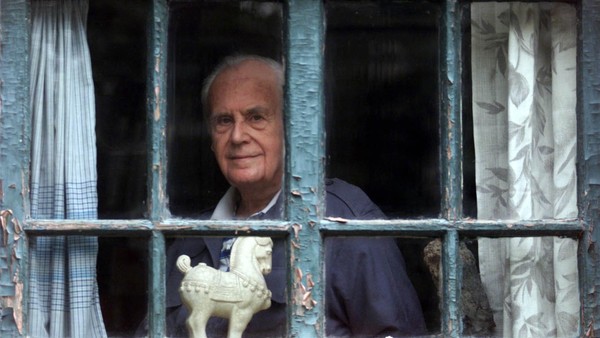Young westerners who ventured to China during the 1980s were surprised to hear a thick Brooklyn accent echoing down the corridors of Beijing’s Friendship Hotel. Sidney Shapiro, the mild-mannered translator who had beaten them to the Middle Kingdom by three decades, took many of the newcomers under his wing, for instance counselling patience and hope to one American who had been forbidden to marry his Chinese fiancée.
上世纪80年代,那些敢来中国转转的西方年轻人惊讶地听到,北京友谊宾馆(Friendship Hotel)的走廊里回荡着一个浓重的布鲁克林口音——说话的人是沙博理(Sidney Shapiro),一位30多年前就来到“中央王国”的温文尔雅的翻译家。许多新来者都受过他的照顾。比如,曾有个美国人被禁止迎娶自己的中国籍未婚妻,是沙博理劝他要有耐心、不要放弃希望。

One of the small band of “foreign friends” who elected to stay in China after Communist rule began, he was himself no stranger to patience, hope and love. Shapiro, who has died aged 98, married there and is survived by his daughter, granddaughter and great-grandson.
作为共产党开始掌权后一小批决定留在中国的“外国友人”之一,沙博理自己就有着大量与耐心、希望和爱有关的经历。他在中国结婚成家,并在女儿、外孙女和曾孙的陪伴下走完人生,享年98岁。
For the many foreigners to have settled in the country since market reforms began, the small group who had adopted Maoist China are a controversial curiosity. Many grew disillusioned – some with Maoism, others with the “capitalism with Chinese characteristics” that followed – and ultimately left. Shapiro was one who found a comfortable equilibrium and stayed.
自中国启动市场改革以来,许多外国人来华定居。在他们看来,沙博理这一小批决定在毛泽东时代中国生活的人是些充满争议的怪人。在这些人当中,有不少人幻想破灭——有些人是对毛泽东思想、也有些人是对后来的“有中国特色的资本主义”大失所望——最终离开了中国。还有些人找到了一种适宜的平衡、留了下来,沙博理就是其中之一。
Born on December 23 1915, the New Yorker had qualified as a lawyer and was already disturbed by the inequalities of Depression-era America when the US Army recruited him to study Mandarin during the second world war. Peace arrived before he could use his skills, so he decided to move to Shanghai in 1947 and work there. He found a city rent by war and poverty – and he also found Feng Zi, or Phoenix, a beautiful Chinese actress and Communist sympathiser.
1915年12月23日,沙博理生于美国纽约。二战期间,美国陆军征他入伍,让他学习现代标准汉语。当时,取得律师资格的他已然对大萧条时期美国的不平等现象深感不安。沙博理还没来得及发挥自己所长,战争就结束了,于是在1947年他决定去上海工作。在那里,他看到了一座饱受战争和贫穷摧残的城市,也遇到了凤子——一位美丽的中国女演员、共产党的同情者。
The couple settled in Beijing shortly before it fell to Mao’s forces. Shapiro witnessed the jubilant arrival of the People’s Liberation Army in Beijing and the triumphant moment when Mao Zedong declared from Tiananmen Gate: “The Chinese people have stood up!” Living in revolutionary China, he had finally found a sense of purpose, he later wrote.
沙博理与凤子结婚后定居北平。很快,这座城市就落入毛泽东的部队手中。沙博理目睹了中国人民解放军进城的欢腾场面,也见证了毛泽东在天安门城楼上宣布“中国人民站起来了”的胜利时刻。他后来写道,生活在革命的中国,他终于找到了一种目标感。
As China became increasingly isolated, Shapiro concentrated on translating the classic saga Outlaws of the Marsh and more recent novels into English. He became a Chinese citizen in 1963. Moreover, he was one of the few foreigners to serve on the Chinese People’s Political Consultative Conference, a top advisory council.
随着中国变得越来越孤立,沙博理开始专心从事将中国古典名著《水浒传》和较近代的小说译为英文的工作。1963年,他加入了中国籍。此外,他还是中国人民政治协商会议为数不多的“洋”委员之一。政协是中国高级别的政治顾问机构。
Shapiro is known too for having compiled and translated local scholarship on ancient Jewish communities in China. “Sidney actually had a shelf of books that were worth working on. A lot of the others had only stacks of China Reconstructs [an English-language monthly],” says Ted Plafker, a Beijing-based journalist and longtime friend.
沙博理还以编译《中国古代的犹太人-中国学者研究文集点评》一书而闻名。他的老朋友、驻京记者泰德•普拉夫克(Ted Plafker)说:“沙博理其实有一柜子著作值得我们研读,其他许多人只有几摞《中国建设》(China Reconstructs,一份英文月刊)。”
When the Cultural Revolution arrived in 1965, no one could avoid politics. Phoenix was sent to a forced labour camp outside Beijing in 1969 and allowed only occasional visits home before her release in 1975. Shapiro managed to avoid imprisonment even as rival factions at the Foreign Languages Press murdered six of his co-workers.
1965年文革爆发,无人能避开政治。凤子在1969年被下放到北京以外的一个强制劳改营,偶尔获准回来探家,1975年才被释放。尽管沙博理有6位同事命丧外文出版社(Foreign Languages Press)的派系斗争,但他却成功地免受牢狱之灾。
In 1971 Shapiro visited his family in the US for the first time in 25 years, in what scholar Anne-Marie Brady sees as part of a wider effort to project a positive impression of China as Mao sought an alliance with his former enemy. He had to dodge the awkward question of why his wife had not come too.
1971年,沙博理25年来首次回美国探亲。在学者安妮-玛丽•布雷迪(Anne-Marie Brady)看来,他的探亲之旅是旨在突出中国正面形象的更广泛努力的一部分,因为毛泽东当时正寻求与美国这一曾经的敌人结盟。但沙博理不得不躲避一个尴尬的问题:为什么他的妻子没有随行?
“The old friends of China (people like Sid Shapiro, New Zealand’s Rewi Alley, and the USA’s Edgar Snow) are part of the idealised revolutionary past, the myth that established the legitimacy of the regime and links it with the present day,” writes Ms Brady, who interviewed Shapiro for her book Making the Foreign Serve China .
“中国的老朋友(比如沙博理、新西兰的路易•艾黎(Rewi Alley)和美国的埃德加•斯诺(Edgar Snow))是理想化革命历史的一部分,这个神话确立了这个政权的合法性,并将之与当今的时代联系在一起,”布雷迪写道。为完成《洋为中用》(Making the Foreign Serve China)一书,她曾采访过沙博理。
Visiting reporters were disappointed to find Shapiro unwilling to offer much critical insight into the turbulent times he had witnessed; his autobiography, I Chose China , was curiously bland. Friends say, however, that he was privately upset by the 1989 crackdown on demonstrators in Tiananmen Square.
前来采访沙博理的记者失望地发现,他不愿对他所见证的动荡岁月给出多少批判性见解;他的自传《我的中国》(I Chose China)平淡得出奇。但他的朋友们表示,他私底下对1989年天安门广场发生的镇压感到难过。
What was clear was that he was no fan of the new, money-driven China under Deng Xiaoping. “When China started going the other way, it bothered him. He was always very opposed to US capitalism, hypocrisy and inequality and he got disillusioned as China got more that way,” says Mr Plafker.
可以肯定的是,他并不喜欢邓小平领导下的一切向钱看的新中国。普拉夫克说:“当中国开始走上另一条道路时,他很困惑。他一贯非常反对美国资本主义、虚伪和不平等,当中国在这条路上越走越远时,他感到无比失望。”
Phoenix died in 1996. Shapiro griped as his quiet alley by the capital’s Qianhai Lake was steadily over-run with rickshaw tours and night clubs opened around the corner. But he embraced modern technologies with enthusiasm. About two years ago, Shapiro sent an email to friends in Beijing and beyond to say that failing eyesight meant his days at the computer were over.
凤子于1996年逝世。沙博理住在北京前海附近一条安静的胡同里,可惜胡同里日益挤满了坐人力车观光的游客,夜店也开得到处都是,让他抱怨不已。但他对现代科技却颇感兴趣。大约两年前,沙博理给北京以及其他地方的朋友发了封电子邮件,说自己视力越来越差,看来要告别电脑了。
But, he added, they could always come to visit.
但他补充道,他们随时都可以来看他。













